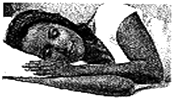题型:阅读选择 题类:真题 难易度:普通
2016年河南省中考英语真题试卷
Have you ever had trouble sleeping in a new place?

Lots of people do. And now researchers from Brown University in Rhode Island think they know why. They found that one-half of the brain "remains more awake" than the other half when people are trying to sleep in a new place.
The sleep findings were reported in Current Biology by Brown University. In their report, the researchers said many people report they have a harder time sleeping the first night at a hotel or other places outside their home. They call it "first-night influence". "In Japan they say, 'If you change your bed, you can't sleep,'" said Yuka Sasaki, one of the report's writers. "You don't sleep very well in a new place. We all know about it."
The researchers measured brain waves (测量脑波) for 35 volunteers over two nights in a laboratory. The two nights were a week apart (间隔). They found during the first night the left half of the brain was more active than the right half. This was during the first deep-sleep period, the researchers said.
Sasaki said a lot of questions remain.
Researchers did not keep measuring brain waves all night long. So, they don't know if the left half keeps "watch" all night, or whether it "works in shifts (轮换) with the right half later in the night". They also do not know why the brain activity, at least during the first period of deep sleep, is always on the left half.
For some, this research may be calming. It is good to know that our brain is "looking out for us" in a new place. But it may not help with sleep. That brain activity, at least according to this new research, makes it harder to get the sleep people need to wake up well rested in the morning.
试题篮